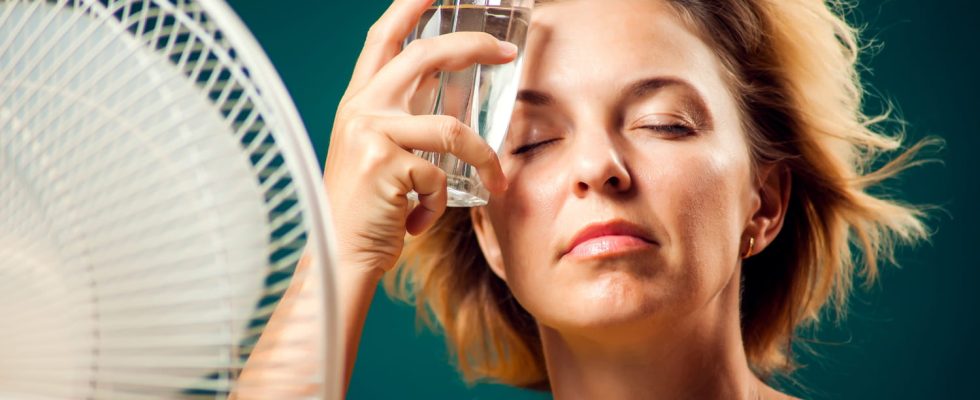From excessive sweating to cramps and potentially fatal heatstroke, here are all the mechanisms that happen in your body when it’s (very) hot, in the event of a heat wave for example.
In summer, France is regularly affected by episodes of heat waves or extreme heat. And when the temperatures rise, our body temperature regulation system is put to the test. Usually, our body naturally cools itself by sweating, but under certain conditions, this sweating is not enough to protect us. “People suffer from heat-related illnesses when the body’s temperature control system is overloaded” says the Center for Disease Control and Prevention (CDC). Here’s what happens to the body when it’s really hot.
We sweat excessively
During hot weather, the body struggles to keep its temperature around 37 degrees, which is its normal temperature. For this, it activates the sweating mechanism which is like a natural cooling system. When sweat evaporates through glands called sweat, it takes the heat away and the body cools down. However, excessive sweating can cause problems.
► Excessive sweating can cause heat cramps which usually occur when we practice intense activity in hot weather. These muscle aches or spasms usually occur in the stomach, arms, or legs.
► In hot and humid weather, it is common to suffer from a rash caused by excessive sweating. This skin irritation, known as heat buttons, can affect all age groups, but it is more common in young children. Heat rashes come in the form of small blisters or clusters of red pimples. They often appear on the neck, chest, groin, under the breasts and in the creases of the elbow. “To relieve this condition, it is recommended to keep the affected area dry and use powder to increase comfort.” advocates the CDC.
We are (more easily) exhausted
Heat exhaustion can appear after several days of exposure to high temperatures and insufficient hydration. It results in particular from excessive perspiration which exhausts the body, forced to work more to produce more sweat.
Body temperature rises
When it is very hot, the body puts its perspiration mechanism into action to cool its temperature. But if temperatures increase significantly, the body is no longer able to regulate its temperature, leading to a rapid increase in it. “In just 10 to 15 minutes, body temperature may exceed 41°C or more“ notify the CDC.
► Heat stroke occurs when the body temperature rises too much, it is a situation that endangers the body which overheats. The sweating mechanism fails, and our body is no longer able to cool itself. Symptoms of heat stroke include dizziness, headache, nausea or vomiting, difficulty breathing, and can lead to death or permanent disability if emergency treatment is not administered quickly.
We lose salts and minerals
Profuse sweating depletes salt and mineral reserves of the body called electrolytes (sodium, potassium and calcium). These are necessary for your body and must be replaced (water, foods rich in minerals…).
► Drink fruit juice, eat a banana or a sports drink when exercising or working in the heat.
We have poorer blood circulation
When it is very hot, the body tries to eliminate the heat to cool down. One way to do this is to move more blood to the surface of the skin. “From about 28 degrees in outside temperature, the blood vessels widen, this is called the vasodilatation. The veins dilate and make difficult blood flow to the heart which implies a feeling of heaviness in the lower limbs (legs). In particular, we observe that the veins become apparent on the surface of the skin in people prone to venous fragility” develops Dr. Ariel Toledano, vascular doctor and angiologist. The phenomenon of vasodilation also lowers blood pressure since the pressure decreases.
► “Massage the legs with cool gels or apply jets of cold water to promote the return of blood to the heart. Compression stockings also counteract the effect of the dilation of the veins. Drinking plenty of water is essential since dehydration can promote blood hypercoagulation and a risk of thrombosis” advocates Dr. Toledano.
Who is most at risk when it’s hot?
Some populations are more vulnerable to heat-related effects. Infants and children up to the age of four, as well as 65 year olds and above, are particularly at risk. Moreover, people in overweight, people with chronic diseases or taking certain medications are also more likely to experience the harmful effects of heat on their body.
► It is therefore essential to stay hydrated, protect yourself from the sun, and take steps to stay cool on particularly hot days, especially for the most vulnerable.
Thanks to Dr. Ariel Toledano, vascular doctor and angiologist
